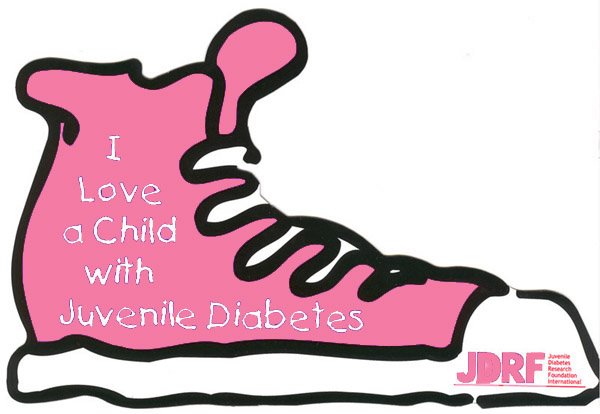A friend of mine left a great question at the end of my last post. I thought I'd post it here and give my fellow d-moms an opportunity to chime in and answer Josie's question.
"Good analogy. I've learned a lot from your blog. I do have a question though, so forgive me if it's an ignorant question. I just thought of it while reading this post. If curing T1 is as simple as a new pancreas (and I don't know if "simple" is quite the right word) couldn't they just cure it by doing a pancreas transplant or something? It seems like I saw an interesting episode on the history channel once about cloning and how they have some really advanced technology for replacing body parts. They have already used it for replacing urethra's and other such body parts. Do you know how close they are to finding some kind of cure for T1? Sorry it's long, I'm just curious if anyone is anywhere near curing this."
My response is, first, it is not an ignorant question. It's a very good question! My answer is this: the pancreas is responsible for many different things, not JUST producing insulin. In order to do a transplant there is a lot that must occur. A donor needs to be found, the body can't reject the transplant, there could be other factors as well. Often times a transplant isn't successful. Right now we have the ability to manage T1 and so to do a transplant could very well cause more problems in other parts of the endocrine system that are now working fine. It is pretty risky and not the best way to cure it. Besides that, to find a pancreas for every T1 person would involve lots of people having to pass away. It's kind of a catch 22 there. Plus, I don't know if this is a factor, but it is believed there is a genetic factor for the people who have T1. Then there is some kind of environmental trigger that tells the body to destroy the islet cells. We don't know why this happens. So, if there were a pancreatic transplant, whose to say the trigger might not cause this pancreas to lose it's ability to produce insulin? Generally speaking there needs to be more than just T1 that is affecting the pancreas in order to warrant a transplant.
As far as advancements in a cure. They have come a long way. They have done islet cell transplants--which are the cells in the pancreas that are responsible for producing insulin. All of that is in the beginning stages though. I am not even sure how they procured the islet cells. Stem cell research has showed promise. Animas (a pump company) teamed with JDRF this year to start developing the first fully functioning artificial pancreas. Those are all pretty cool things but still probably years and years away from getting to the point that they can be mass produced.
Of course, one thing I do worry about is politics. They play a part in everything. Sometimes I worry that pharmaceutical companies might try to "buy" the postponement of a cure. Type 1 Diabetes is a very, very expensive disease. The amount of money we have to spend to buy products to keep our kids alive is ridiculous...marked up I'm sure because it's a necessity. So, it makes sense, if a cure were found, these pharm companies would take a big hit. So, are they greedy enough to try and postpone a cure at the expense of my little girl? Well, I don't know for sure, but I wouldn't put it past them. I'm not sure how much, if any, that would play a part but it does cross my mind when I think about a cure.
So that is my answer...I hope it made sense. Maybe some of my other d-moms will have some better insights to help answer your question. Thanks again Josie!
2 years ago








10 comments:
Very well said, Shamae!
The thing I have heard about pancreas transplants is that the anti-rejection drugs you would have to be on FOREVER have some pretty severe side effects. I know there have been a few of these done and they have not had great results. I know the insulin needs went away, but a whole bunch of other problems came along.
Hi Shamae!
The issue with Pancreatic Transplants is a few. First off, you need to be in pretty rough shape to receive one...like usually you would be a type 1 person with renal failure as well...and you go in for a kidney and pancreas transplant at the same time. Secondly, since type 1 is an autoimmune disease...you never know when the body will attack the new pancreas' beta cells. I think the answer to a cure is two-fold...the auto-immune component MUST be addressed (and is in many studies) and insulin production MUST be restored (which is also being studied). I too worry about the politics and "big business" with all of it. I actually tear up even thinking of companies holding off on a cure due to the money involved in managing this disease.
xoxo...have a great weekend!
What a wonderful answer shamae . You did a great job . You are awesome my dear friend .
I think your response was perfect Shamae. :)
I was going to say the same as Tracy. I think, IF I can remember correctly... those who have recieved a transplant, are somewhat confined (?) because of the greater risk of getting sick (?).
I remember thinking "whats the point if you can't enjoy life".
I also try NOT to think about the drug companies... would I put it past them? NOPE! But I sure hope they wouldn't.
Yup Yup. First, the demand would be higher than the supply, and second the anti-rejection drugs can be worse than diabetes itself. They usually don't do a pancras transplant, unless there is another organ that HAS to be replaced...then they throw in the pancreas for good measure. :)
Yup.
What y'all said.
:)
Hi Shamae,
I had an islet cell transplant in 2008 and have been off of insulin for about 20 mos. now. I do take immunosuppressants, but the side effects of them are not nearly as difficult to deal with as those of insulin. Right now, I don't have any. I really feel cured. You are right, there are not enough pancreases to go around, but pig islet research trials are looking successful. I am looking forward to the time when all diabetics will have the opportunity that I have had, or better. I really believe that we are close.
Best wishes,
Kathy
Gosh, I feel special. A whole post dedicated to my question! Thanks for the responses. Kathy, your experience is really cool. I do realize how risky transplants are, and that it's really not a simple fix. That's scary about the drug companies though, I never would have thought anyone could be so self-serving and dishonest. I guess it makes sense though. I hope they can find a cure and that Sydney can be a part of it all. You guys are awesome!
Great answer! I don't have much to add, but a couple of my own thoughts. I looked into being one of the research subjects for the islet cell transplantation. I've been diabetic for 20+ years. My daughter was diagnosed when she was 27 months. In order to do the cell transplants, you have to be done with having children. Pregnancy is too hard on the body and would destroy any cure that they have. So....when will there be a cure for our daughters? Not until after they've decided they're done having children. Sad, but it doesn't mean there isn't hope for after they've had their babies!
Thanks for posting this question Shamae and answering it and also for the comments that followed.
I too have wondered about the same question at different times. I have learned from others who have had different transplants that a transplant is not such an easy answer either but hopefully there will be continued success in this field and more answers toward cures.
Post a Comment